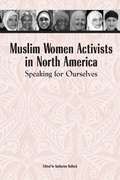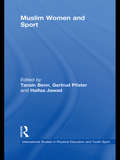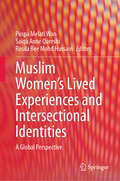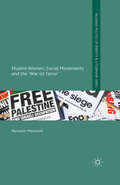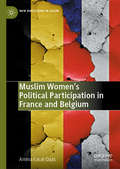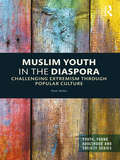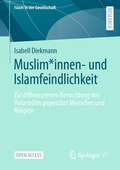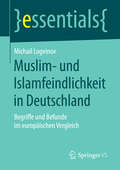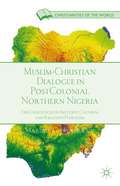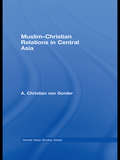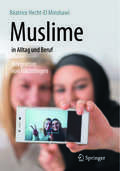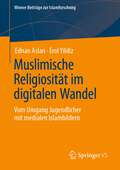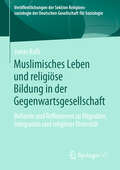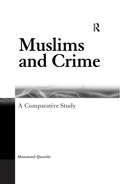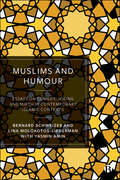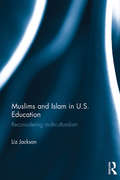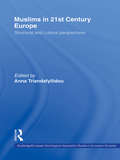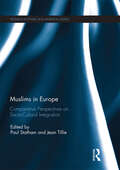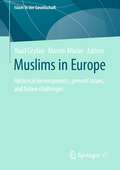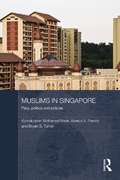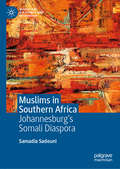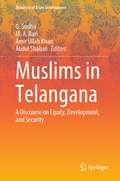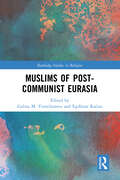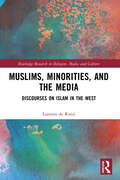- Table View
- List View
Muslim Volunteering in the West: Between Islamic Ethos and Citizenship (New Directions in Islam)
by Mario Peucker Merve Reyhan KayikciThis edited volume explores various facets of Muslims’ civic engagement in Western post-secular societies, fundamentally challenging simplistic boundaries between Islamic ethical conduct and liberal-democratic norms and practice.Bringing together scholars from sociology, anthropology, and Islamic theology, the collection offers sound theoretical and empirical elaborations on the complex ways in which Islamic piety, principles and norms interact with, and shape, Muslims’ everyday practice of volunteering as a performance of active citizenship in liberal societies. The contributions cover diverse manifestations of Muslim volunteering in North America, Europe and Australia, from environmentalism to mental health volunteering, and critically examine the national and global socio-political context within which certain forms of Muslims’ civic engagement are viewed with skepticism and suspicion. It will be of use to students and scholars across sociology, political science, community studies and Islamic studies, with a focus on migrant integration, diaspora studies, and inter-ethnic relations.
Muslim Women Activists in North America: Speaking for Ourselves
by Katherine BullockIn the eyes of many Westerners, Muslim women are hidden behind a veil of negative stereotypes that portray them as either oppressed, subservient wives and daughters or, more recently, as potential terrorists. <P><P>Yet many Muslim women defy these stereotypes by taking active roles in their families and communities and working to create a more just society. This book introduces eighteen Muslim women activists from the United States and Canada who have worked in fields from social services, to marital counseling, to political advocacy in order to further social justice within the Muslim community and in the greater North American society.
Muslim Women and Sport (Routledge Studies in Physical Education and Youth Sport)
by Tansin BennExamining the global experiences, challenges and achievements of Muslim women participating in physical activities and sport, this important new study makes a profound contribution to our understanding of both contemporary Islam and the complexity and diversity of women’s lives in the modern world. The book presents an overview of current research into constructs of gender, the role of religion and the importance of situation, and looks closely at what Islam has to say about women’s participation in sport and what Muslim women themselves have to say about their participation in sport. It highlights the challenges and opportunities for women in sport in both Muslim and non-Muslim countries, utilizing a series of extensive case-studies in various countries which invite the readers to conduct cross-cultural comparisons. Material on Iraq, Palestine and Bosnia and Herzegovina provides rare insights into the impact of war on sporting activities for women. The book also seeks to make important recommendations for improving access to sport for girls and women from Muslim communities. Muslim Women and Sport confronts many deeply held stereotypes and crosses those commonly quoted boundaries between ‘Islam and the West’ and between ‘East and West’. It makes fascinating reading for anyone with an interest in the interrelationships between sport, religion, gender, culture and policy.
Muslim Women's Lived Experiences and Intersectional Identities: A Global Perspective
by Puspa Melati Wan Saiqa Anne Qureshi Rosila Bee Mohd HussainThis volume takes a global perspective on intersectionality embodied by Muslim women. It addresses questions such as balancing multiple identities, lived experiences and complex realities, and the role of faith in social roles. The chapters debunk the idea of Islam or gender being monoliths. They layer faith over gender across the globe and consider migration as an important factor, thereby exploring intersectional identities that are understudied and under-evaluated. The volume overall brings to life Islamic women's lives in all their richness and differences, with discussions on social roles, positions, initiatives, and occupations across regions. It provides recommendations and suggestions for readers to understand the complex realities of Muslim women as well as serves as a guide for practitioners and policy-makers.
Muslim Women, Social Movements and the 'War on Terror' (Palgrave Politics of Identity and Citizenship Series)
by Narzanin MassoumiOn 15th February 2003, two million people marched in the streets of London to call on the British government not to go to war with Iraq. Though Britain did enter war, the movement did not rest in defeat. This book tells the story of what happened behind the scenes of this extraordinary mass movement, looking specifically at the political relationship between Muslim and leftist activists.Crisis narratives about Muslims assume that they are only engaged with sectarian communalist forms of identity politics or that their supposed religious and social conservatism is incompatible with progressive values. Through telling this story, Massoumi looks closely at the role of identity politics within social movements, considering what this means in practice and whether we can meaningfully speak of identity politics. Arguing that identity politics can only be understood within the context of a wider social and political structure, this book analyses the conditions through which Muslim and leftist engagement emerges within this movement, and highlights the decisive leadership of Muslim women.
Muslim Women’s Political Participation in France and Belgium (New Directions in Islam)
by Amina Easat-DaasThis book outlines the principal motivations, opportunities and barriers to Muslim women’s political participation in France and francophone Belgium. Easat-Daas draws on in-depth comparative contextual analysis along with semi-structured interview material with women from France and Belgium who self-identify as Muslim and are active in a variety of modes of political participation, such European Parliamentarians, Senators, councilwomen, trade-union activists and those engaged in grass-roots political movements. This provides an alternative framing of Muslim women, removed from the tired and often exaggerated stereotypes that portray them as passive objects or sources of threat, instead highlighting their remarkable resilience and consistent determination. Through exploring the intersecting fault lines of racial, Islamophobic and gendered struggles of Muslim women in these two cases, this book also sheds new light on the role of ‘European Islam’, political opportunity structures, secularism and Muslim women’s dress.
Muslim Youth in the Diaspora: Challenging Extremism through Popular Culture (Youth, Young Adulthood and Society)
by Pam NilanIn a world where the term Islam is ever-increasingly an inaccurate and insensitive synonym for terrorism, it is unsurprising that many Muslim youth in the West struggle for a viable sense of identity. This book takes up the hotly-debated issue of Muslim youth identity in western countries from the standpoint of popular culture. It proposes that in the context of Islamophobia and pervasive moral panic, young Muslims frame up their identity in relation to external conditions that only see ‘good’ and ‘bad’ Muslims, on both sides of the ideological fence between Islam and the West. Indeed, by attempting to break down the ‘good’ versus ‘bad’ Muslim dichotomy that largely derives from western media reports, as well as political commentary, Muslim Youth in the Diaspora: Challenging Extremism through Popular Culture will enlighten the reader. It illuminates the way in which diasporic Muslim youth engage with, and are affected by, the radical Islamist meta-narrative. It examines their popular culture and online activity, their gendered sense of self, and much more. This original book will be of interest to students and scholars interested in the fields of sociology, cultural studies and social anthropology. It offers a particular focus on Islam for research in youth studies, youth culture, political radicalisation and religious identity. It will also be relevant to the sector of youth and social work, where practitioners seek to build cultural bridges with a new generation.
Muslim*innen- und Islamfeindlichkeit: Zur differenzierten Betrachtung von Vorurteilen gegenüber Menschen und Religion (Islam in der Gesellschaft)
by Isabell DiekmannDieses Open-Access-Buch zeigt, dass feindliche Einstellungen gegenüber Muslim*innen oder als Muslim*innen markierten Menschen und gegenüber der Religion des Islams oftmals nur wenig differenziert betrachtet werden. Die mangelnde Trennschärfe zwischen Einstellungen gegenüber Menschen auf der einen und einer Religion auf der anderen Seite manifestiert sich etwa in Definitionen, in denen Islam und Muslim*innen in scheinbar untrennbarer Art und Weise zueinander konstruiert werden oder im Operationalisierungsprozess, wenn auf manifester Ebene Einstellungen gegenüber Muslim*innen erhoben werden, das Konstrukt jedoch als Islamfeindlichkeit bezeichnet wird. Diese Studie untersucht, (1) ob eine synonyme Verwendung der Begriffe gerechtfertigt ist oder ob sich empirisch nachweisen lässt, dass Islam- und Muslim*innenfeindlichkeit nicht identisch sind, (2) inwiefern Unterschiede im Ausmaß feindlicher Einstellungen gegenüber dem Islam und gegenüber Muslim*innen bestehen und (3) wie sich Deutungsrahmen der Befragten mit den Begriffen 'Islam' und 'Muslim*innen' voneinander unterscheiden. Die Zerlegung in seine Einzelteile ermöglicht es, das Phänomen in all seinen Dimensionen zu verstehen und wichtige theoretisch-konzeptionelle, methodologische und handlungspraktische Konsequenzen abzuleiten.
Muslim- und Islamfeindlichkeit in Deutschland: Begriffe und Befunde im europäischen Vergleich (essentials)
by Michail LogvinovMichail Logvinov geht in diesem essential der Frage nach, ob die in den deutschen Meinungsumfragen gemessene Islamfeindlichkeit bzw. Islamophobie eine spezifische Auspr#65533;gung hat. Er schl#65533;gt konsensf#65533;hige Begriffsbestimmungen vor, erarbeitet die Kriterien, an denen die Islam- und Muslimfeindlichkeit in Deutschland festgemacht werden k#65533;nnen, und geht auf deren historische und soziale Ursachen ein. Die Frage, was bei Islamfeindlichkeit eigentlich gemessen wird und ob es in Deutschland ein besonderes ,,Feindbild Islam" gibt, ist gerade in Zeiten der ,,Pegida" und neuen extremistischen Formationen wie den ,,Pro-Bewegungen" relevant. Setzt sich doch die (verstehende) Sozialwissenschaft zum Ziel, Aussagen #65533;ber die Qualit#65533;t sozialer Konflikte treffen und L#65533;sungsvorschl#65533;ge anbieten zu k#65533;nnen.
Muslim-Christian Dialogue in Postcolonial Northern Nigeria: The Challenges of Inclusive Cultural and Religious Pluralism (Christianities of the World)
by Marinus C. IwuchukwuIwuchukwu examines the perennial conflicts in different parts of northern Nigeria and why they are popularly called Muslim-Christian clashes. Specifically, he examines the immediate and remote factors that are responsible for the conflicts.
Muslim-Christian Relations in Central Asia (Central Asian Studies)
by Christian van GorderThis book explores issues of cultural tension that affect Muslim and Christian interaction within the Central Asian context. It looks at the ways that Christians have interacted with Central Asian Muslims in the past, and discusses what might need to be done to improve Muslim-Christian relations in the region in the present and future. Since the time that Nestorian Christian missionaries traveled eastward from Asia Minor along the Silk Road, and Islamic cultures came to the region in the 7th century, Christians and Muslims have shared a unique relationship in a fascinating cultural milieu. Under the reigns of various conquerors, Czars, Soviets and modern nationalist strong-men, the ever changing political and economic situation of these former Soviet Republics has dramatically affected the ways that Muslims and Christians have practiced their faith. Today, as Muslims and Christians work to stabilize their interactions, they face new challenges because of the activities of Protestant Christian and Islamist missionaries who are flooding into Central Asia as never before. The book corrects common misunderstandings of Central Asia as a cultural backwater, and is a valuable introduction to Muslim and Christian interactions in one of the most quickly changing regions of the globe. It will appeal to readers interested in Muslim-Christian interaction, and for researchers in the field of World Religions, Central Asian Studies and Intercultural Studies.
Muslime in Alltag und Beruf: Integration von Flüchtlingen
by Béatrice Hecht-El MinshawiIn diesem Buch erfahren alle, die Flüchtlingen und Asylbewerbern begegnen – privat wie beruflich –, wie sie zu einem guten Miteinander beitragen können. In Deutschland gibt es viele Neubürger und Migranten: Exilanten, Flüchtlinge und Asylbewerber. Ein Großteil kommt aus islamischen Gesellschaften und ist mit manchen anderen Normen und Werten aufgewachsen. Deshalb ist davon auszugehen, dass wir immer öfter Muslimen in Beruf und Alltag begegnen. Sie gehören zu uns. Damit das Zusammenleben und die Zusammenarbeit gelingt, ist ein fundiertes interkulturelles Wissen notwendig: kulturelle Gemeinsamkeiten und Unterschiede, Mentalitäten, Verhaltensregeln, Kommunikationsstrategien und Tabus. Dieses Praxisbuch hilft, Muslime zu verstehen und vermittelt Ideen zum gemeinsamen Handeln – mit zahlreichen Fallbeispielen und Checklisten. Es richtet sich als Beratungsbuch und Arbeitsgrundlage an alle Personen im deutschsprachigen Raum, die mit Muslimen zu tun haben, in privaten und öffentlichen Einrichtungen wie Behörden und Schulen und in Betrieben.
Muslimische Religiosität im digitalen Wandel: Vom Umgang Jugendlicher mit medialen Islambildern (Wiener Beiträge zur Islamforschung)
by Erol Yildiz Ednan AslanDie Wirkungen der sozialen Medien sind besonders in Bezug auf das religiöse Engagement und die religiösen Praktiken junger Menschen zu beobachten – die heute unter Begriffen wie „Internetgeneration“, „Mediengeneration“ oder „Digital Natives“ zusammengefasst werden. Online-Medien üben großen Einfluss auf ihr Leben, ihr Weltverständnis, ihre religiösen Orientierungen und Handlungen aus. Ihre Identitätskonstruktionen, ihre kulturellen und religiösen Orientierungen sind aufs Engste mit sozialen Medien verflochten. Genau hier setzte die vorliegende Studie mit der Frage an, welche subjektiven Konsequenzen die Interaktion im Social Web für religiöse Orientierungen, Praktiken und Selbstentwürfe muslimischer Jugendlicher in Österreich hat. Dabei standen die Zusammenhänge zwischen Mediennutzung, medialen Islambildern und gelebter Religiosität im Mittelpunkt. Die Ergebnisse zeigen einerseits, dass der Umgang mit Social Media objektive Möglichkeitsräume schafft, die mit einer Erweiterung individueller Handlungsspielräume einhergehen können, wobei religiöse Autorität zunehmend hinterfragt wird. Andererseits geht aus der Studie ebenfalls hervor, dass die Nutzung digitaler Medien auch zur Verengung individueller religiöser Orientierungen führen kann.
Muslimisches Leben und religiöse Bildung in der Gegenwartsgesellschaft: Befunde und Reflexionen zu Migration, Integration und religiöser Diversität (Veröffentlichungen der Sektion Religionssoziologie der Deutschen Gesellschaft für Soziologie)
by Jonas KolbDas Buch befasst sich mit zwei Themen, die eng miteinander verwoben sind: muslimisches Leben und islamische Bildung. Die in diesem Band versammelten Aufsätze liefern zum einen tiefgreifende religionssoziologische Einblicke in die Bandbreite und Vielschichtigkeit der muslimischen Glaubenspraxis, die unterschiedlichen Dimensionen von Religiosität im Alltag und die Ausprägungen muslimischer Lebenswelten in der deutschsprachigen Gegenwartsgesellschaft. Zum anderen werden die empirischen Analysen für Bildungskontexte, die islamische Religionspädagogik, den islamischen Religionsunterricht, die verschiedenen Lernorte islamischer Bildung, interreligiöse Lehr- und Lernkonstellationen sowie die Lehrer*innenbildung im Generellen fruchtbar gemacht. Die Aufsatzsammlung entwickelt in diesem Zusammenhang gegenwärtige bildungswissenschaftliche Ansätze zu den Themen Schule, Bildung und Pädagogik vor dem Hintergrund migrationsbedingter Prozesse weiter. Mit der systematischen Verschränkung von religionssoziologischen Befunden und bildungsbezogenen Analysen betritt das vorliegende Buch wissenschaftliches Neuland. Der Empirie, empirischen Forschungsmethoden und Erkenntnissen wird damit als wesentlichen Grundlagen theoretischer Reflexionen im Bereich der islamisch-theologischen Studien die gebührende Anerkennung verschafft.
Muslims and Crime: A Comparative Study
by Muzammil QuraishiIn the aftermath of 9/11 a critical analysis of offending and victimisation of Asian Muslims is desperately required. Muslims and Crime addresses this need by means of a comparative criminological evaluation of British and Pakistani South Asian Muslims. In addition to providing a succinct review of contemporary studies in the field, Muzammil Quraishi evaluates issues of offending and victimization amongst South Asian Muslims; develops an understanding of Islamic criminal law and its influence on crime and social control by means of a comparative evaluation between Britain and Pakistan; explores the nature of Islamophobia and its impact on South Asian Muslims in Britain and Pakistan; explores the American 'Critical Race Theory' perspective within British and Pakistani contexts; and examines the construction of racial stereotypes during colonial encounters and how far these may be traced into the post-colonial social terrain. The book will interest academics in sociology, criminology, race and ethnicity, and law. The themes explored will also be of significant interest to practitioners within criminal justice institutions.
Muslims and Humour: Essays on Comedy, Joking, and Mirth in Contemporary Islamic Contexts
by Bernard SchweizerThis thought-provoking collection offers a multi-disciplinary approach on the subject of humour, Muslims, and Islam. Beginning with theoretical perspectives and scriptural guidance on permissible and restricted humour, the volume presents a variety of case studies about Muslim comedic practices in various cultural, political, and religious contexts. This unprecedented scholarship sheds new light on common misconceptions about humour and laughter in Islam and deftly tackles sensitive themes from blasphemy to freedom of speech. Chapter 9 is available Open Access via OAPEN under CC-BY-NC-ND licence.
Muslims and Islam in U.S. Education: Reconsidering multiculturalism
by Liz JacksonWinner of Philosophy of Education Society of Australasia (PESA)'s inaugural PESA Book Awards in 2015, and The University of Hong Kong Research Output Prize for Education 2014-15. Muslims and Islam in U.S. Education explores the complex interface that exists between U.S. school curriculum, teaching practice about religion in public schools, societal and teacher attitudes toward Islam and Muslims, and multiculturalism as a framework for meeting the needs of minority group students. It presents multiculturalism as a concept that needs to be rethought and reformulated in the interest of creating a more democratic, inclusive, and informed society. Islam is an under-considered religion in American education, due in part to the fact that Muslims represent a very small minority of the population today (less than 1%). However, this group faces a crucial challenge of representation in United States society as a whole, as well as in its schools. Muslims in the United States are impacted by ignorance that news and opinion polls have demonstrated is widespread among the public in the last few decades. U.S. citizens who do not have a balanced, fair and accurate view of Islam can make a variety of decisions in the voting booth, in job hiring, and within their small-scale but important personal networks and spheres of influence, that make a very negative impact on Muslims in the United States. This book presents new information that has implications for curricula, religious education, and multicultural education today, examining the unique case of Islam in U.S. education over the last 20 years. Chapters include: Perspectives on Multicultural Education 9/11, the Media, and the New Need to Know Islam and Muslims in Public Schools Blazing a Path for Intercultural Education This book is an essential resource for professors, researchers, and teachers of social studies, particularly those involved with multicultural issues, critical and sociocultural analysis of education and schools; as well as interdisciplinary scholars and students in anthropology and education.
Muslims in 21st Century Europe: Structural and Cultural Perspectives (Studies in European Sociology)
by Anna TriandafyllidouMuslims in 21st Century Europe explores the interaction between native majorities and Muslim minorities in various European countries with a view to highlighting different paths of integration of immigrant and native Muslims. Starting with a critical overview of the institutionalisation of Islam in Europe and a discussion on the nature of Muslimophobia as a social phenomenon, this book shows how socio-economic, institutional and political parameters set the frame for Muslim integration in Europe. Britain, France, Germany, the Netherlands, and Sweden are selected as case studies among the 'old' migration hosts. Italy, Spain and Greece are included to highlight the issues arising and the policies adopted in southern Europe to accommodate Muslim claims and needs. The book highlights the internal diversity of both minority and majority populations, and analyses critically the political and institutional responses to the presence of Muslims.
Muslims in Europe: Comparative perspectives on socio-cultural integration (ISSN)
by Paul Statham Jean TillieAtrocities by terrorists acting in the name of the ‘Islamic State’ are occurring with increasing regularity across Western Europe. Often the perpetrators are ‘home grown’, which places the relationship between Muslims and the countries in which they live under intense political and media scrutiny, and raises questions about the success of the integration of Muslims of migrant origin. At the same time, populist politicians try to shift the blame from the few perpetrators to the supposed characteristics of all Muslims as a ‘group’ by depicting Islam as a threat that seeks to undermine liberal democratic values and institutions. The research in this volume attempts to redress the balance by focusing on the views and life experiences of the many ‘ordinary’ Muslims in their European societies of settlement, and the role that cultural and religious factors play in shaping their social relationships with majority populations and public institutions. The book is specifically interested in the relationship between cultural/religious distance and social factors that shape the life chances of Muslims relative to the majority. The study is cross-national, comparative across the six main receiving countries with distinct approaches to the accommodation of Muslims: France, Germany, Britain, the Netherlands, Belgium and Switzerland. The research is based on the findings of a survey of four groups of Muslims from distinct countries of origin: Turkey, Morocco, the former Yugoslavia, and Pakistan, as well as majority populations, in each of the receiving countries. This book was originally published as a special issue of the Journal of Ethnic and Migration Studies.
Muslims in Europe: Historical developments, present issues, and future challenges (Islam in der Gesellschaft)
by Rauf Ceylan Marvin MückeSince the migration movements from Islamic countries, a Muslim diaspora has developed in many Western societies. While in classical Islamic theology residence in non-Muslim countries has always been a controversial issue, in the course of globalization and internationalization processes the classical distinction between "Islamic world" and "non-Islamic world" has been put into perspective. Now nearly 30 million Muslims live in Europe. The book offers an overview over Muslim communities in Europe, their history, present issues, and future challenges.
Muslims in Singapore: Piety, politics and policies (Routledge Contemporary Southeast Asia Series #26)
by Bryan S. Turner Kamaludeen Mohamed Nasir Alexius A. PereiraThis book examines Muslims in Singapore, analysing their habits, practices and dispositions towards everyday life, and also their role within the broader framework of the secularist Singapore state and the cultural dominance of its Chinese elite, who are predominantly Buddhist and Christian. Singapore has a highly unusual approach to issues of religious diversity and multiculturalism, adopting a policy of deliberately ‘managing religions’ - including Islam - in an attempt to achieve orderly and harmonious relations between different racial and religious groups. This has encompassed implicit and explicit policies of containment and ‘enclavement’ of Muslims, and also the more positive policy of ‘upgrading’ Muslims through paternalist strategies of education, training and improvement, including the modernisation of madrassah education in both content and orientation. This book examines how this system has operated in practice, and evaluates its successes and failures. In particular, it explores the attitudes and reactions of Muslims themselves across all spheres of everyday life, including dining and maintaining halal-vigilance; education and dress code; and practices of courtship, sex and marriage. It also considers the impact of wider international developments, including 9/11, fear of terrorism and the associated stigmatization of Muslims; and developments within Southeast Asia such as the Jemaah Islamiah terrorist attacks and the Islamization of Malaysia and Indonesia. This study has more general implications for political strategies and public policies in multicultural societies that are deeply divided along ethno-religious lines.
Muslims in Southern Africa: Johannesburg’s Somali Diaspora (Migration, Diasporas and Citizenship)
by Samadia SadouniThis book presents a socio-historical analysis of the Somali Muslim diaspora in Johannesburg and its impact on urban development in the context of Somali migrations in the Southern African Indian Ocean region from the end of the 19th Century to today. The author draws on a combination of archival and ethnographic research to examine the interlocking processes of migration, urban place-making, economic entrepreneurship and transnational mobility through the lens of religious practice and against the background of historical interactions between the Somali diaspora and the British and Ottoman Empires. Comparison with other Muslim diasporas in the region, primarily Indians, adds further depth to an investigation which will shed new light on the Somali experience of mobility and the urban development of South Africa across its colonial, apartheid and democratic periods. The politics of race, imperial and post-imperial identities, and religious community governance are shown to be key influencing factors on the Somali diaspora in Johannesburg. This sophisticated analysis will provide a valuable resource for students and scholars of urban geography, the sociology of religion, and African, race, ethnic and migration studies.
Muslims in Telangana: A Discourse on Equity, Development, and Security (Dynamics of Asian Development)
by Abdul Shaban G. Sudhir M. A. Bari Amir Ullah KhanThis book analyses the state of development of Muslims at the regional level. It explains the linkages between the findings of global, national, and state-level studies with regard to the current status of Muslims and broadens understanding of Muslims and their participation in virtually all major sectors, including the economy, housing, demography, health, migration, state policy, and affirmative action. The book presents the challenges faced by the community and reflects upon the socio-economic and educational conditions of Muslims in Telangana State. It presents a comparative analysis of mortality data, maternal health, delivery care, and child immunization, as well as reproductive health aspects and children’s nutritional status. It shares valuable insights into the impacts of emigration and internal migration on health among local Muslims and presents a detailed analysis of data from the Census of India, NSSO, and Commission of Inquiry on Socio-Economic and Educational Status of Muslims regarding the social, economic, and demographic situation of Muslims in Telangana, as well as their opportunities for development under the newly formed state government. The book would be of great interest to scholars and researchers in development economics, sociology, politics, history, cultural studies, minority studies, Islamic studies, and policy studies, as well as policymakers, civil society activists, and those working in media and journalism.
Muslims of Post-Communist Eurasia (Routledge Studies in Religion)
by Egdūnas Račius Galina M. YemelianovaThis book discusses the evolution of state governance of Islam and the nature and forms of local Muslims’ rediscovery of their ‘Muslimness’ across post-communist Eurasia. It examines the effects on the Islamic scene of the political and ideological divergence of Central and South-Eastern Europe from Russia and most of the Caucasus and Central Asia. Of particular interest are the implications of the proliferation of new, ‘global’ interpretations of Islam and their relationship with existing ‘traditional’ Islamic beliefs and practices. The contributions in this book address these issues through an interdisciplinary prism combining history, religious studies/theology, social anthropology, sociology, ethnology and political science. They analyse the greater public presence of Islam in constitutionally secular contexts and offer a critique of the domestication and accommodation of Islam in Europe, comparing these to what has happened in the international Eurasian space. The discussion is informed by the works of such thinkers as Talal Asad, Bryan Turner, Veit Bader, Marcel Maussen and Bassam Tibi, and utilises primary and secondary sources and ethnographic observation. Looking at how collectivities and individuals are defining what it means to be Muslim in a globalised Islamic context, this book will be of great interest to scholars of Religious Studies, Islamic Studies, Political Science, Sociology and Anthropology.
Muslims, Minorities, and the Media: Discourses on Islam in the West (Routledge Research in Religion, Media and Culture)
by Laurens de RooijInspired by overtly negative coverage by the Western mainstream press of Muslims in particular, and minorities in general, this book asks: Why are negative narratives and depictions of Muslims and other minorities so hard to change? News reports about Islam and Muslims commonly relate stories that discuss terrorism, violence or other unwelcome or irrational behaviour, or the lack of integration and compatibility of Muslims and Islam with Western values and society. Yet there is little research done on how studies on media reports about minorities seemingly fail to improve the situation. Combining empirical research with a structural analysis of the media industry, this volume presents evidence for the maligned representation of minorities by media corporations, analysing why negative narratives persist and outlining how these can be effectively transformed. It is an outstanding resource for students and scholars of media, religion, culture, sociology, and Islamic studies, and is also of benefit for journalists, media representatives, and activists looking to effect change for minority representation in the media industry specifically or in society at large.

